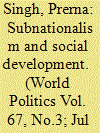| Srl | Item |
| 1 |
ID:
152228


|
|
|
|
|
| Summary/Abstract |
Does the enumeration of ethnic, racial, and/or religious categories on national household censuses increase the likelihood of conflict? The authors propose a theory of intergroup relations that emphasizes the conflictual effects of institutionalizing boundaries between social identity groups. The article investigates the relationship between counting and various forms of conflict with an original, global data set that classifies the type of enumeration used in more than one thousand census questionnaires in more than 150 countries spanning more than two centuries. Through a series of cross-national statistical analyses, the authors find a robust association between enumeration of ethnic cleavages on the census and various forms of competition and conflict, including violent ethnic civil war. The plausibility of the theory is further demonstrated through case study analysis of religious conflict in India.
|
|
|
|
|
|
|
|
|
|
|
|
|
|
|
|
| 2 |
ID:
139923


|
|
|
|
|
| Summary/Abstract |
The quality of life that a person leads depends critically on where it is led. Even taking into account levels of economic development, the chances of an individual surviving through infancy, growing up literate, or living a healthy, long life vary dramatically across regions of the world, in different countries, and within the same country. What are the causes of such variation in wellbeing? This article points to a factor that has been virtually ignored in the vast scholarship on social welfare and development—the solidarity that emerges from a sense of shared identity. The argument marks an important departure from the traditional emphasis on the role of class and electoral politics, as well as from the dominant view of the negative implications of identity for welfare. Combining statistical analyses of all Indian states and a comparative historical analysis of two Indian provinces, Kerala and Uttar Pradesh, this article demonstrates how the strength of attachment to the subnational political community—subnationalism—can drive a progressive social policy and improve developmental outcomes.
|
|
|
|
|
|
|
|
|
|
|
|
|
|
|
|